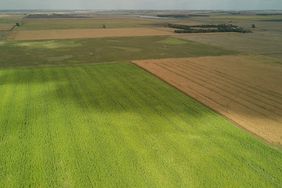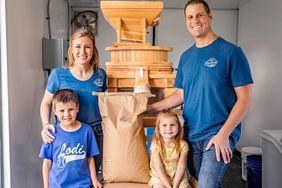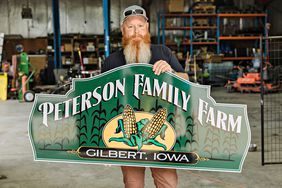:max_bytes(150000):strip_icc()/7019537farm_dusk-501709026_pschoenfelder_preview-783ed5ecf73a4df79ae409208910605f.jpg)
Getty Images, pschoenfelder, Arctic-Images
The Oxford English Dictionary defines twilight as, “the soft, glowing light from the sky when the sun is below the horizon; or a period or state of obscurity, ambiguity, or gradual decline.” When farmers or ranchers without farming heirs look at the future of their operations, it may feel that they are watching the sun sink.
While it’s difficult to determine the exact number of farms without farming heirs, some historical and census data points to a trend. For example, 68% of farmers who responded to the 2014 Iowa Farm and Rural Life Poll had no adult children who were farming. A few years later, in 2017, Iowa State University’s Iowa Farmland Ownership and Tenure Survey found 53% of the state’s farmland was leased out. By 2023, that number had jumped to 58%.
The Iowa State survey also shows a drop in sole ownership and joint tenancy of farmland from 80% in 1982 to 52% in 2023. On the other hand, farmland held in trusts has skyrocketed from only 1% in 1982 to 23% in 2023.
According to the 2017 Census of Agriculture, the average age of American farm producers is 57.5 years, up 1.2 years from 2012. More than one-third of farmers are over age 65, and there are more than four times as many farmers over age 65 than under age 35. These figures help paint the picture of an American farmer who is getting older without an on-farm heir, putting farmland into a trust for off-farm heirs who are then leasing out that farmland.
John J. Schwarz II is an agricultural attorney focusing on farm law. He is witnessing this trend firsthand in his Indiana practice. He says one-third to one-half of his farmer clients are twilight farmers — they do not have heirs who plan to take over.
Learn from the past
One of Schwarz’s twilight farmer clients is Bill Urschel. The fourth generation to own his family’s farm near Urbana, Indiana, he and his wife, Andrea, have two adult daughters. “The girls love to come home and be at the farm, but they never wanted to farm,” he says.
Urschel learned the importance of estate planning the hard way. He says his parents had a plan that left him
the farm, and his nonfarming sisters would have received other property and life insurance benefits. After his father died four years ago, he received a letter from his mother saying because of the increase in farmland value, she no longer felt the prior agreement was fair, and she was leaving her shares to his sisters in her will. Urschel was 63 at the time.
As it often happens in these cases, a dispute ensued, and a lawsuit was filed. In the end, a settlement was reached allowing Urschel to buy out his mother. Even though he was retiring from farming, he pursued the acquisition to keep the farm together for future generations.
He ended up having to sell land he owned separately from the family farm, most of his equipment, and a large amount of grain in order to pay his mom.
Then the taxes hit. The land sale resulted in Urschel having to pay capital gains tax. He had to pay depreciation recapture on the machinery sale. And, since he had carried grain over from the last year he farmed into the first year he didn’t farm, he didn’t have expenses to offset the sale, resulting in hefty income taxes.
“I still own 480 acres of the family ground, but it took a lot of money to pay my mom and take care of taxes,” he says. “It just makes you sick when your family already paid for the land once, then you get hit with 30% tax payments. That money could’ve been used for so many other things.”
Even more devastating than the financial loss, Urschel says, his relationships with his mom and sisters were destroyed. “My dad would have never thought this could happen,” he says. “I didn’t want to lose my mom. It changed me.”
A new dawn
Today the farm is being worked by two young men Urschel has known all their lives. Agreements include a combination of cash rent and crop share. “We have a good relationship. It’s nice because I can help them in the fall and haul grain in the winter,” he says. “I’m learning a lot from them too, seeing all the new technology. There’s nothing like having young blood around. With everything that went wrong, I’m still very fortunate.”
The Urschels have worked with a team of professionals, including Schwarz, who grew up on a farm and now farms his own ground, to craft a plan for their farm’s future and make sure their daughters have a smooth transition. “Don’t be afraid to work hard to find the right people for your team,” Urschel advises. “Without John, we didn’t know what we were going to do for a while. He helped us and we’ll always be grateful for that.”
Urschel’s machinery and farm ground are now owned by a corporation, and the corporation is owned by a trust. The trust is revocable and amendable while Bill and Andrea are alive but becomes irrevocable when one dies. When both are gone, each daughter gets half of the income from the farm but cannot sell. Upon their passing, the grandchildren step into their shoes. “I never really felt like it was mine to sell,” Urschel says. “The guy upstairs owns it all. I just wanted it to help my kids and grandkids.”
Schwarz says provisions in the plan can help grandchildren buy in if they want to farm. A rule book governs what happens if someone wants to be bought out.
Urschel likes the idea of his grandchildren having that opportunity. “We don’t know what’s coming. There may be something ag related that has nothing to do with corn or soybeans that a grandchild may be able to use the land for,” he says. “It has helped everyone in my family for four generations, and I didn’t want that to die with me.”
Explore your options
The key to successfully navigating a twilight farm situation is planning. “There’s no rule of thumb in this business of farm transition,” says Kelvin Leibold, an Iowa State University (ISU) Extension farm management specialist. “They’re all kitchen table discussions and require strategy over a period of time.”
ISU Extension offers these options for twilight farmers:
- Continue to operate on a full- or part-time basis, possibly scaling back.
- Live on the farm but lease the land with a cash lease, crop share lease, or a combination of the two. Some farmers will do a crop share on tillable land and cash rent on hay ground and pasture, but keep in mind, many renters also will be looking for housing.
- Hire a custom farmer to plant, till, and harvest or operate the ranch for a fixed fee. This eliminates labor but requires the landowner to make daily decisions and run the business. The risks of farming are still at play, but there’s more potential for profit.
- Sell the farm, move, and invest proceeds for retirement. While this can be emotionally difficult, it sometimes makes the most financial sense, although tax implications must be considered.
- Transition or sell to a young farmer. This is one way to ensure the farm continues to operate and may be a more attractive option than selling for development, for example.
When it comes to machinery, Leibold recommends transferring it without an auction or lease-to-own contract, as this may result in a large recapture of prior income tax depreciation. Tying an equipment lease to a lease-on-land contract, for example, can eliminate Social Security tax on that income. Another option is to sell equipment a piece at a time as needed to roll income back a few years.
Leibold says because farmland is in short supply, finding a renter shouldn’t be too hard. “I’d suggest they first start renting out the land they own and keep renting any land they’re renting,” he says. Shifting land from a Schedule F to a Schedule E can help avoid some Social Security taxes.
“Renting to a nonrelated party is easier sometimes because then you don’t have all the family issues,” he says. “If they don’t do what you think they should be doing, you can have a discussion. There are too many young producers out there with good skill sets to put up with somebody who isn’t good.”
In addition to matching programs through Extension or other sources (see “Online Resources for Retiring and Beginning Farmers”), Leibold advises farmers to check with seed and fertilizer dealers and ag lenders. “They know who the top producers are in the area and can help with matches,” he says. “Identify someone who has the initiative, management skills, and work ethic to make this happen.”
Overcoming obstacles
When a producer without an heir finds a young farmer to work with, that’s just the beginning of what can be a very long and difficult process. The younger farmer has a lot of hoops to jump through, including securing financing. That requires creating a business plan complete with goals, qualifications, strategies for dealing with unknowns, cash flow, and collateral.
One factor affecting financing is student loan debt. According to a 2022 survey from the National Young Farmers Coalition, 38% of young farmers and ranchers hold student loan debt, and 20% say it is the main reason they have not taken out additional ag loans. The numbers are even higher for young, Black farmers.
If the financing doesn’t come together, the young farmer may have to pivot to another plan, although, Leibold says, “We can always find some money through USDA financing programs.” Each state has a dedicated beginning farmer and rancher coordinator who can help with questions about working with USDA.
When things don’t work out, the farm owner must start the process all over again. Leibold says it can take several tries before a match and transition plan are successfully completed, which is why it’s never too early to start the process. He recommends bringing in an outsider to help in a mediation role.
“If you started off with a transition and it doesn’t work, don’t give up hope,” he says. “Step back and see what the issues were and what could be done to have made the strategy work better and give it a second try. These are not easy things to do.”
When things look bleak, remember what the dictionary says. While twilight is most often thought of as occurring just before nightfall, the dictionary says it is “when the sun is below the horizon.” That happens twice every day. It’s true that one twilight leads to an end, but the other hearkens a new day.
Online resources for retiring and beginning farmers
The Farmland Information Center, a project of American Farmland Trust, offers guides to leasing land, tips for finding the next generation for your farm, and advice on landlord-tenant relationships. It also offers sample farm leases and rental forms, a rental agreement checklist, and tips for determining rental rates, as well as a list of local, state, and federal matching programs: farmlandinfo.org.
The National Young Farmers Coalition has compiled an extensive list of organizations that help connect landowners and those seeking land. It includes national, regional, and state listings: youngfarmers.org.
The Land Stewardship Project’s Farm Beginnings program connects Midwest farmers with those seeking farmland: landstewardshipproject.org.
Iowa State University Extension farm management specialist Kelvin Leibold says most states have matching programs, and he advises landowners and young farmers to check out listings from other areas. Relocation may be an option for certain beginning farmers if the opportunity is right. “Look beyond your own state,” he says.
:max_bytes(150000):strip_icc()/LisaFoustPrater-5d5284849acc417c8678324f9c660161.jpg)










